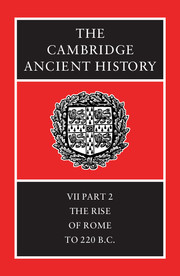Book contents
- Frontmatter
- 1 The Sources for Early Roman History
- 2 Archaic Rome Between Latium and Etruria
- 3 The origins of Rome
- 4 Rome in the fifth century I: the social and economic framework
- 5 Rome in the fifth century II: the citizen community
- 6 Rome and Latium to 390 B.C.
- 7 The recovery of Rome
- 8 The conquest of Italy
- 9 Rome and Italy in the early third century
- 10 Pyrrhus
- 11 Carthage and Rome
- 12 Religion in Republican Rome
- Appendix
- Chronological Table
- BIBLIOGRAPHY
- Index
- Fig. 50:The city of Rome in the early third century b.c.
- Map 11: The western Mediterranean in the third century
- References
11 - Carthage and Rome
Published online by Cambridge University Press: 28 March 2008
- Frontmatter
- 1 The Sources for Early Roman History
- 2 Archaic Rome Between Latium and Etruria
- 3 The origins of Rome
- 4 Rome in the fifth century I: the social and economic framework
- 5 Rome in the fifth century II: the citizen community
- 6 Rome and Latium to 390 B.C.
- 7 The recovery of Rome
- 8 The conquest of Italy
- 9 Rome and Italy in the early third century
- 10 Pyrrhus
- 11 Carthage and Rome
- 12 Religion in Republican Rome
- Appendix
- Chronological Table
- BIBLIOGRAPHY
- Index
- Fig. 50:The city of Rome in the early third century b.c.
- Map 11: The western Mediterranean in the third century
- References
Summary
CARTHAGINIAN PUBLIC AND PRIVATE LIFE
(a) The Carthaginian state
The Carthaginian state impressed the ancient world not only for its wealth, but also for its stability and endurance. Its riches may have provoked envy, and its increasing corruption contempt, but its tenacity evoked respect even from Greeks and Romans, its age-long enemies. Thus Cicero wrote (Rep. fr. 3) ‘Carthage would never have held an empire for six hundred years had it not been governed with wisdom and statesmanship’, and Aristotle classed its constitution with those of Sparta and Crete as one of the three actual states which through their stability most nearly approached the ideal ‘mixed’ polity (Pol.ii. 127 b ff): it was in fact the only non-Hellenic constitution that he included in his long series of constitutional studies. Isocrates (Nicocles 24) echoes the same theme: ‘the Carthaginians and Lacedaemonians, who are the best-governed peoples in the world’ (τους άριστα των άλλων πολιτευομένους) Wealth and constitutional stability were closely linked. The wealth of Carthage derived from her territorial empire in North Africa and the western Mediterranean; it was safeguarded by naval protection of her overseas trade which in turn provided her with financial means to maintain a strong navy. Further, her commercial success gave political power to a timocratic oligarchy which, by providing the state with the means of hiring a mercenary army instead of depending upon a large citizen militia, decreased the risk of military coups and enhanced political stability.
The early history of Carthage has already been described in earlier volumes. including the gradual way she dominated the other Phoenician settlements in the West and added her own quota to the number of Semitic colonies; her extending influence in North Africa, Spain, Sardinia and Sicily; her establishment of a commercial monopoly in western waters and the consequential struggles (at times in concert with the Etruscans) with the Greek cities which challenged her ascendancy; her continuing success in the extreme west and her fluctuating fortunes in Sicily.
- Type
- Chapter
- Information
- The Cambridge Ancient History , pp. 486 - 572Publisher: Cambridge University PressPrint publication year: 1990
References
- 3
- Cited by

